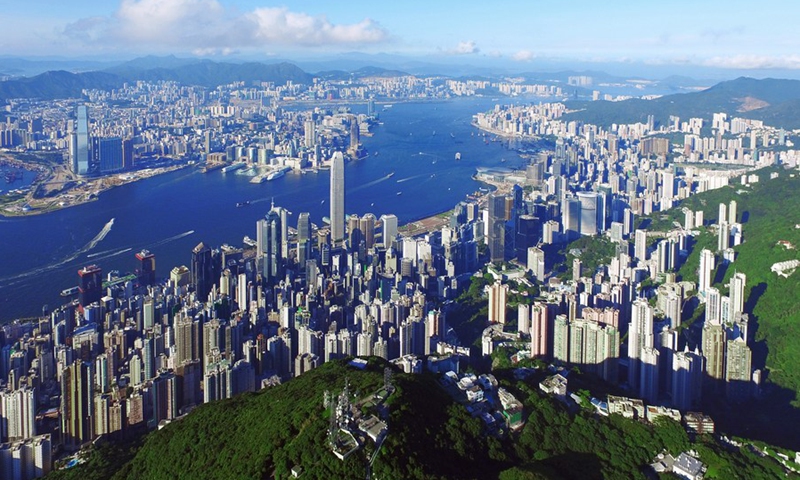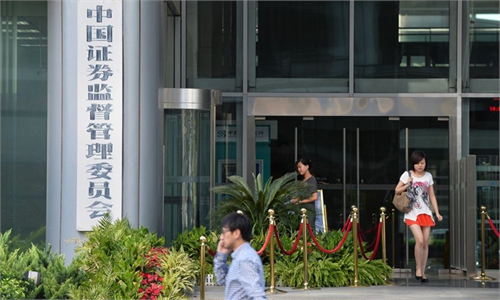HK stamp duty hike to boost city’s revenue, won’t destabilize market
Move unlikely to destabilize market, will boost city's fiscal revenues: analysts

Aerial photo taken on June 27, 2017 shows the scenery on the both sides of the Victoria Harbor in Hong Kong, south China.(Photo: Xinhua)
A stamp-duty hike on stock transactions in the Hong Kong Special Administrative Region (HKSAR), the first such move in nearly three decades, is due to come into effect on Monday, five months after it was initially unveiled.
The change will increase trading costs, but it's unlikely to destabilize the market, analysts said, citing the city's sound company fundamentals and business environment. Moreover, with a reassuring message from the Chinese mainland's securities regulator, the long-planned change won't increase volatility, they noted.
The stamp duty increase from 0.1 percent to 0.13 percent on every trade was officially confirmed in early June, after Hong Kong Financial Secretary Paul Chan Mo-po revealed a government proposal for the 30-percent rise in late February.
The hike will be the first in Hong Kong since 1993.
"The increase will surely have some implications for the Hong Kong market when it comes to trading costs, but so long as local listings point to viable businesses and the city's business environment is stable, the tweak won't affect market stability," Dong Shaopeng, an expert advisor for the China Securities Regulatory Commission (CSRC), told the Global Times on Sunday.
According to Hong Kong's stamp duty rules and local bourse requirements, every sale or purchase of stocks in the city, including every trade of local stocks via the southbound link between the HKSAR and Chinese mainland stock exchanges, will be subject to the new duty rate starting on Monday.
The move is a government response to fiscal strains amid the COVID-19 pandemic, as the city's fiscal deficit widened to 5.8 percent of GDP in 2020, the largest gap in nearly 30 years.
China International Capital Corp, one of the country's top investment banks, estimated in a report earlier this year that the stamp-duty rise would boost local fiscal revenues by about 2 percent, while resulting in an additional cost of HK$39 million ($5.02 million) per day for the equity market.
Both the A-share and HKSAR markets have priced in the impact on investor sentiment, market observers said.
"The higher stamp duty is intended to curb speculation, and it will also reduce volatility," Wu Jinduo, head of fixed income at the research institute of Great Wall Securities, told the Global Times on Sunday.
The benchmark Hang Seng Index lost 4.98 percent over the past week while the Hang Seng TECH Index posted a weekly loss of 6.7 percent, in line with a losing week for Chinese mainland shares amid market anxiety - especially over the mainland's regulatory toughening against after-school tutoring firms.
Despite net outflows via the southbound connect amid recent swings, it's the fundamentals of locally traded companies that will determine whether the market appeals to investors, Wu said.
Dong said that the appeal of the Hong Kong market remains intact, although efforts are still required for the city to restructure its capital market to attract more top technology firms.
The HKSAR has become a fundraising hub, especially for mainland-based technology behemoths that are betting on the Hong Kong and mainland bourses as the US is doubling down on efforts to crack down on Chinese businesses.
In a fresh attempt, the US Securities and Exchange Commission (SEC) announced on Friday that IPO filings by issuers associated with China-based operating firms won't be declared effective unless they provide certain disclosures, such as permission from Chinese authorities to pursue US listings, and the impact on their financial performance of government actions.
Responding to the new US curbs, China's securities regulator reiterated in a statement on Sunday its open stance on the choices of IPO destinations on the part of Chinese firms.
The CSRC called for regulatory authorities in China and the US to strengthen communication on the oversight of US-listed Chinese firms and seek an adequate solution to anchor market expectations.
The agency also vowed to coordinate investors, businesses and regulators to achieve improved transparency and predictability in the case of policies and measures that aim for a balance between development and security in certain industries.
The CSRC's message bodes well for addressing overseas investors' concerns over the country's regulatory policy transparency and predictability, Wu said.
As Dong put it, the US securities regulator and US investors ought to fully understand the necessity of tougher regulations on cybersecurity, among other steps, for China's national security, as there's a scuffle between the two economies in national security terms.
The probability of more US-traded firms opting for a shift to Chinese markets will benefit the HKSAR exchange, Wu said.


